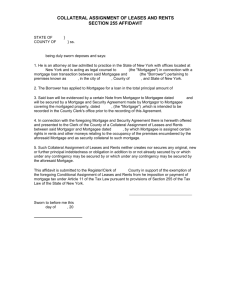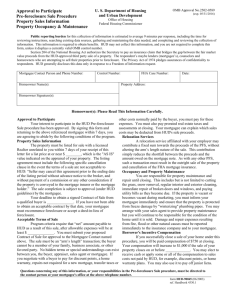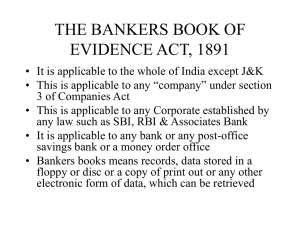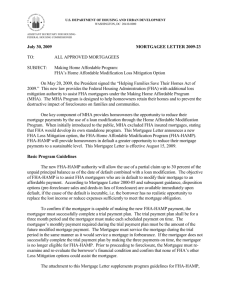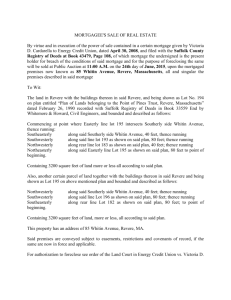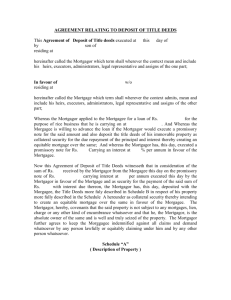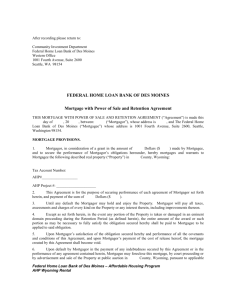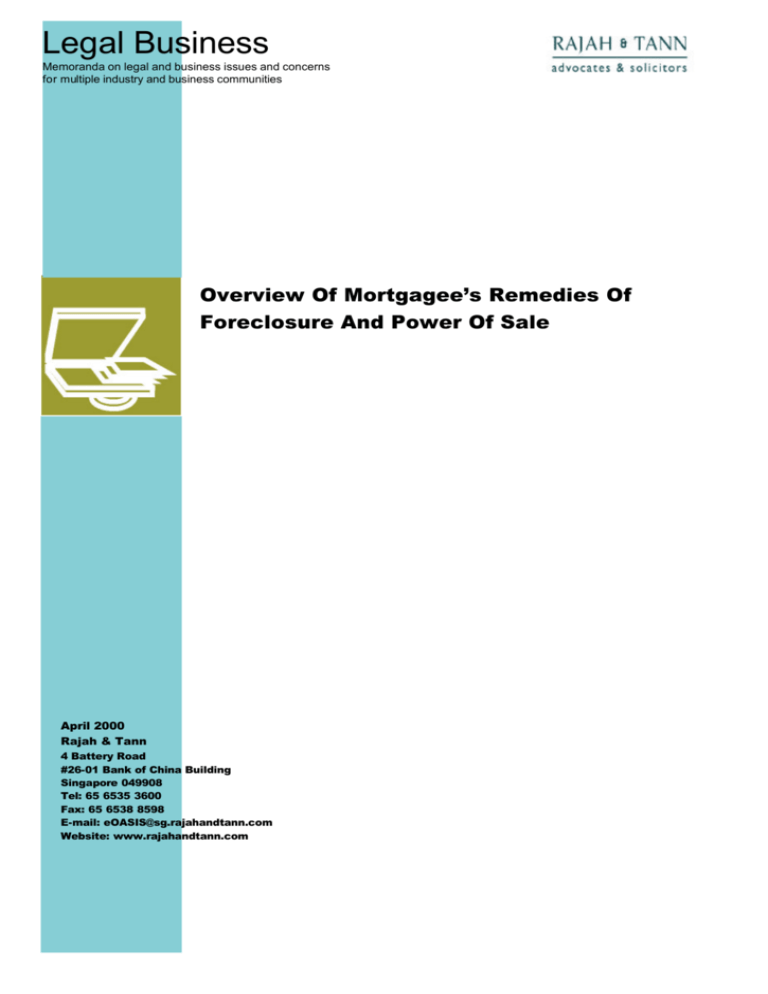
Legal Business
Memoranda on legal and business issues and concerns
for multiple industry and business communities
Overview Of Mortgagee’s Remedies Of
Foreclosure And Power Of Sale
1
April 2000
Rajah & Tann
4 Battery Road
#26-01 Bank of China Building
Singapore 049908
Tel: 65 6535 3600
Fax: 65 6538 8598
E-mail: eOASIS@sg.rajahandtann.com
Website: www.rajahandtann.com
Legal Business
Miscellaneous
Overview Of Mortgagee’s Remedies Of Foreclosure And Power
Of Sale
Introduction
A mortgagee of property has four principle remedies available to him in enforcing his mortgage over
the property: foreclosure, sale, possession and the appointment of a receiver. This memorandum will
examine the remedies of foreclosure and sale. It will also, as part of its examination of the power of
sale remedy, look at the remedy of possession, as an ancillary part of the exercise of the power of
sale.
Background
Generally speaking, a mortgage entails a transfer of ownership of the mortgaged property to the
creditor. This transfer of ownership is to provide security to the creditor for moneys which it has lent,
either to the mortgagor or to a third party borrower. The transfer is subject to the condition that the
property will be reconveyed back to the owner of the property when the borrowed moneys have been
returned.
Because the mortgagor of the property retains the right to have ownership of the property returned to
him upon repayment of the borrowed sum, he is said to retain an ‘equity of redemption’ in the
property.
Foreclosure
The Features Of Foreclosure
(a)
Foreclosure as a remedy may only be effected by an order by the court. When a mortgagee
seeks to foreclose on a mortgage, he is essentially asking the court to vest the title of the
mortgaged property in him, free of the mortgagor’s equity of redemption. The vesting is made
in satisfaction of the mortgagee’s right to have the debt repaid to him.
(b)
In other words, upon a foreclosure order being made, two rights are extinguished: the
mortgagee’s right to have the mortgaged property returned to him subject to full repayment of
the debt, and the mortgagor’s right to have the debt repaid.
(c)
As the mortgagor takes the property in satisfaction of the debt, he bears the risk that the
property is worth less than the amount of the debt which remains outstanding. He has no
further recourse to the mortgagor to claim the difference between the value of the property
and the value of the outstanding debt.
(d)
Conversely, if the property is worth more than the outstanding debt, the mortgagee will
receive a windfall, and the mortgagor has no right to the amounts in excess of the outstanding
debt.
© Rajah & Tann, Knowledge Management
April 2000
Page 1
Legal Business
(e)
Miscellaneous
As a foreclosure order, if granted, extinguishes the mortgagor’s equity of redemption,
foreclosure proceedings should not be commenced unless the mortgagor has lost his right to
redeem the property. Accordingly, a mortgagor should only apply for foreclosure after the
legal date for redemption has passed, as then, the mortgagor’s right to redeem has clearly
ceased.
The Procedure For Effecting Foreclosure
(a)
Because of the possibility of a windfall passing to the mortgagee, the court is usually reluctant
to make a foreclosure order without giving the mortgagee every chance to redeem. This
reluctance is reflected in a two stage procedure for effecting foreclosure.
(b)
The court first makes an interim order directing that an account be taken of what is due to the
mortgagee and to give the mortgagor a final opportunity to pay within a stipulated period. This
order is known as a foreclosure nisi.
(c)
If the mortgagor fails to make payment by the stipulated date, the mortgagee applies for an
order which, if granted, operates to vest the mortgagor’s entire estate in the mortgagee. This
order is known as a foreclosure absolute.
(d)
The entire proceedings, from commencing the foreclosure nisi to obtaining the foreclosure
absolute usually takes about 4 to 6 months. As a consequence of this protracted length of
time, foreclosure proceedings tend to be very rare.
Sale
Features Of The Remedy Of The Power Of Sale
(a)
The mortgagee may instead seek to sell the mortgaged property, and recover his debt from
the moneys received from the sale of the property. An exercise of the power of sale is quicker
and usually requires no order of court.
(b)
Standard mortgage deeds will usually contain a clause giving the mortgagee a right to sell the
mortgaged property upon default by the mortgagor. However, even if the mortgage deed
omits such a clause, the power of sale is implied under section 24 of the Conveyancing and
Law of Property Act.
(c)
The exercise of a power of sale is not the same as an act of foreclosure. In a sale, the
mortgagee is not entitled to retain any proceeds from the sale in excess of the balance debt
due to him. All he is entitled to is to have the outstanding debt (including any interest accruing
on the debt) repaid. Any excess must be forwarded to the mortgagor. Conversely, where the
price received for the property is less than the outstanding debt, the mortgagee is entitled to
claim the unpaid portion of the debt (after the sale) from the mortgagor.
(d)
These differences arise from the fact that the mortgagee is merely exercising a power to
realise his security by selling it, and is not seeking to have the property conveyed in toto into
his name. In a sense, the mortgagor is effectively saying to the mortgagee, “I can’t afford to
© Rajah & Tann, Knowledge Management
April 2000
Page 2
Legal Business
Miscellaneous
repay you. Why don’t you sell the property in order to raise the money which I owe to you,
and use that money to repay yourself.”
The Exercise Of The Power Of Sale
(a)
The mortgagee can only exercise the power of sale under certain specified circumstances.
Where the power of sale is provided for in the mortgage deed, the deed will also usually set
out the circumstances under which the power may be exercised. For example, a mortgage
deed may provide that the power of sale may be exercised upon the expiration of 14 days
after a demand has been made on the mortgagor for the repayment of the moneys secured
by the mortgage. If at the expiration of 14 days no payment is received, the mortgagee can
effect a sale of the property.
(b)
The exercise of a power of sale is quicker and usually requires no court order. In exceptional
cases, the mortgagee may wish to apply to court for a court ordered sale of the property.
Circumstances where the mortgagee may wish to seek a court ordered sale are where there
is a dispute as to the validity of the mortgage or where title to the property is in doubt. One
advantage of a court ordered sale is that the court may order the sale free from the claim, and
this may hopefully fetch a higher price for the property.
(c)
If the mortgagee chooses to apply for a court ordered sale, where the property is sold without
the mortgagee first entering into possession, the process is fairly quick, and the application to
court can be heard within 4 to 6 weeks.
Seeking Vacant Possession Prior To A Sale
(a)
The remedy of possession is usually exercised as a precursor of a sale so that the mortgagee
can given vacant possession to the purchaser of the mortgaged property. This is because it is
hoped that the ability to be able to pass vacant possession on to the purchaser would
increase the value of the mortgaged property.
(b)
Where the mortgagee has a legal mortgage of land not registered under the Land Titles
Register, the legal estate is conveyed to him. This gives him an immediate right to possession
of the property which is not dependent on there being a default by the mortgagor.
(c)
This is in contrast to the situation of a mortgagee who has a registered mortgage of land
registered under the Land Titles Register. Such a mortgagee only has a right to possession of
the mortgaged property once the mortgagor defaults in this payments of the interest, principal
or other money secured by the mortgage. This right arises under section 75 of the Land Titles
Act and before a mortgagee can enter into possession of the mortgaged property, section 75
of the Land Titles Act provides that the mortgagee must give the mortgagor one month’s
notice of its intention to do so. Upon the expiration of the one month notice, if vacant
possession is not peaceably given, then the mortgagee can apply to court for possession.
Upon obtaining the order of court for possession, the mortgagor is given one last chance to
deliver vacant possession or to pay up.
(d)
In the event that no possession is given or the outstanding amounts are not settled, the
mortgagee must apply to court for a writ of possession to be given. Pursuant to this writ of
possession, the court baliff will attend at the premises and take possession of it. The whole
© Rajah & Tann, Knowledge Management
April 2000
Page 3
Legal Business
Miscellaneous
process can take anything from 2 months to almost 4 years. Once possession has been
obtained, a sale can be effected.
Rajah & Tann is one of the largest law firms in Singapore. It is a full service firm and given its alliances, including US premier firm
Weil, Gotshal & Manges, is able to tap into a number of countries.
Rajah & Tann is firmly committed to the provision of high quality legal services. It places strong emphasis on promptness,
accessibility and reliability in dealings with clients. At the same time, the firm strives towards a practical yet creative approach in
dealing with business and commercial problems.
The information contained in this newsletter is correct to the best of our knowledge and belief at the time of writing. Specific
professional advice should be sought before any action is taken. In this regard, you may call the lawyer you normally deal with in
Rajah & Tann or e-mail the Knowledge Management team at eOASIS@sg.rajahandtann.com
© Rajah & Tann Knowledge Management. All rights reserved.
© Rajah & Tann, Knowledge Management
April 2000
Page 4


